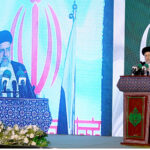NEW YORK, Apr 01 (APP): A prominent Kashmiri leader has expressed the hope that the recent US State Department human rights report, which reproached India on its rights record, will mobilize American policy makers and members of Congress to do everything in their constitutional power to stop the killings in occupied Kashmir.
In a statement, Ghulam Nabi Fai, secretary-general of the Washington-based World Kashmir Awareness Forum, said the report, which deals with the year 2020 and was released on Tuesday, takes “the veil of secrecy off India’s crimes against humanity,” referring to what he called “graphic documentation” of the Indian military’s human rights violations in Jammu & Kashmir.
“This is a significant step towards greater international recognition of the serious abuses committed against Kashmiris at the hands of Indian army,” he added.
Fai called the report “well documented” about the developments following India’s annexation of Jammu and Kashmir that resulted in massive human rights violations, particularly targeting women and children.
“The sanctity of women has been violated, in a gruesome and unforgiving fashion,” he said.
The country report also said, “There were allegations of enforced disappearance by the Jammu and Kashmir police. Although authorities denied these charges and claimed no enforced disappearances had occurred since 2015, the International Federation for Human Rights reported that cases of enforced disappearances continued through 2019.
“In February the U.N. Working Group on Enforced or Involuntary Disappearances identified seven cases under its standard procedures concerning individuals who were arrested, detained, or otherwise deprived of rights.”
But, it said, the Working Group had not received permission to visit the country since it first submitted a request to the government in 2010.
The country report cites specific incidents where the Indian Government violated the principles of human decency and democratic freedom in Kashmir.
“In responding to demonstrations that started in July 2016, Indian security forces used excessive force that led to unlawful killings and a very high number of injuries. … One of the most dangerous weapons used against protesters during the unrest in 2016 was the pellet-firing shotgun.”
About arbitrary arrests and detention, it says, “Following the central government’s August 2019 abrogation of a special constitutional provision that provided autonomous status for Jammu and Kashmir, authorities used a public safety law to detain local politicians without trial. Most detainees were released during the year.
Media reports indicated those released were required to sign bonds agreeing not to engage in political activity.
“In April,” the report says, “Mohammed Yasin Malik, leader of the pro-independence Jammu and Kashmir Liberation Front (JKLF), was arrested and charged with murder in the death of four Air Force officials in 1990.
Malik was denied the right to be physically present in court. Human rights groups in Kashmir, including the JKCCS (Jammu and Kashmir Coalition of Civil Society), expressed concern regarding whether Malik was receiving a fair trial.”
The report says, “Various domestic and international human rights organizations continued to express serious concern at the use of pellet guns by security forces for crowd-control purposes in Jammu and Kashmir.
In March the Jammu and Kashmir High Court dismissed the public interest litigation petition seeking a ban on the use of pellet guns on protesters, asserting that police have the right to administer force in self-defense when facing violent protests.”
Citing many examples of torture which has been used against civilians in Jammu & Kashmir, the report says, “A May 2019 report by the JKCCS and the Association of Parents of Disappeared Persons alleged that police, military, and paramilitary forces in Jammu and Kashmir used torture against civilians and opposition over the past four decades.”
The report documented 432 testimonies from individuals who claimed to have been tortured.
“There were continued allegations of physical abuse and torture following the government’s enhanced security measures in Jammu and Kashmir after the August 2019 move to abrogate Article 370 of the constitution.”
The report says, “Jammu and Kashmir was an exception, where the state government sometimes denied permits to separatist political parties for public gatherings, and security forces reportedly occasionally detained and assaulted members of political groups engaged in peaceful protests. During periods of civil unrest in Jammu and Kashmir, authorities used the law to ban public assemblies and impose curfews.
“The government continued to decline access by the United Nations to Jammu and Kashmir and limit access to the northeastern states and Maoist-controlled areas.
“In an August statement, it notes, “UN human rights experts called on the government ‘to take urgent action to address the alarming human rights situation in the territory’.”
The UN special rapporteurs, it said, also noted that since August 2019, “the human rights situation in Jammu and Kashmir has been in free fall’ and they were ‘particularly concerned that during the COVID-19 pandemic, many protesters are still in detention and Internet restrictions remain in place.”
Also, in the executive summary of the section on India, the report also included a long list of significant human rights issues in India, which were dealt with in some detail later in the document. It referred to “unlawful and arbitrary killings” by police; torture by some police and prison officials; “arbitrary” arrests and detentions; “harsh and life-threatening” prison conditions; political prisoners or detainees in certain states.
It also referred to “restrictions on freedom of expression and the press, including violence, threats of violence, or unjustified arrests or prosecutions against journalists, use of criminal libel laws to prosecute social media speech, censorship, and site blocking”.
The summary went on to list “overly restrictive rules” on non-governmental organizations; “restrictions” on political participation; “widespread corruption at all levels in the government”; “lack” of investigation of and accountability for violence against women;
“tolerance” of violations of religious freedom; crimes involving violence and discrimination targeting members of minority groups including women based on religious affiliation or social status; and “forced and compulsory child labour, as well as bonded labour”.




